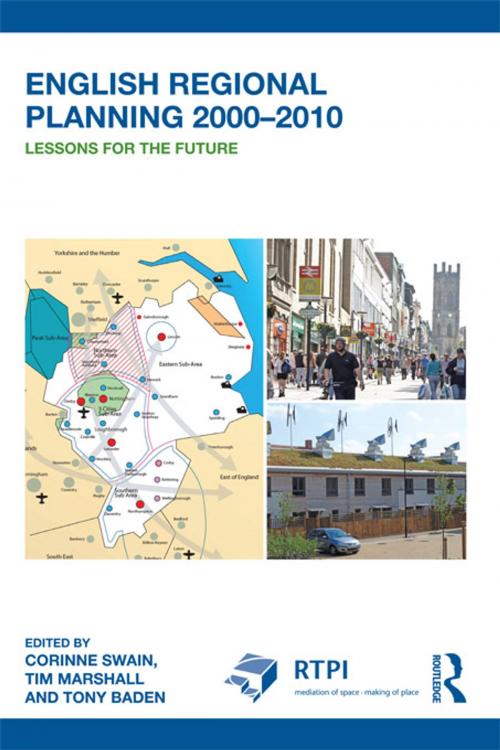English Regional Planning 2000-2010
Lessons for the Future
Nonfiction, Art & Architecture, Architecture, Landscape, Planning, Social & Cultural Studies, Political Science, Politics, City Planning & Urban Development| Author: | ISBN: | 9781136290992 | |
| Publisher: | Taylor and Francis | Publication: | July 26, 2012 |
| Imprint: | Routledge | Language: | English |
| Author: | |
| ISBN: | 9781136290992 |
| Publisher: | Taylor and Francis |
| Publication: | July 26, 2012 |
| Imprint: | Routledge |
| Language: | English |
English Regional Planning 2000-2010 chronicles a vital feature of recent UK planning activity, during the period of the Blair and Brown Labour governments up to 2010. It deals particularly with the regional scale of planning during these years, whereby large steps forward were made, but where policy making often proved very controversial. One purpose of the book is to learn from the many areas of policy development, method and skills which evolved during the decade up to 2010. This will mean that a future return to strategic planning should not have to reinvent the wheel. This book also helps to inform such planning in the rest of the developed world where higher-level planning is more prevalent.
The book has eight chapters written by experts active in English regional planning during these years, alongside two chapters by the editors introducing and concluding on the experience as a whole. Thematic topics covered include the way in which housing and employment development was tackled in the varying English regional contexts, and the growing influence of transport and environmental factors on the spatial strategy. Process elements covered include how policy was made through public consultation and working with numerous stakeholders (economic, social, environmental), how the public examination of issues was organised, followed by final consideration by central government, and how monitoring informed the next policy review.
The authors do not gloss over the difficulties encountered in the highly contested world of English local and regional politics, or the ways in which central government management of the regional planning process made life on the ground difficult for those engaged in the process. Nevertheless the account as a whole shows how a wealth of innovative and forward looking practices were developed. This multi-faceted study contributes to the understanding of how strategic planning can provide the framework for guiding spatial change and allocating resources, looking to a long-term sustainable future.
English Regional Planning 2000-2010 chronicles a vital feature of recent UK planning activity, during the period of the Blair and Brown Labour governments up to 2010. It deals particularly with the regional scale of planning during these years, whereby large steps forward were made, but where policy making often proved very controversial. One purpose of the book is to learn from the many areas of policy development, method and skills which evolved during the decade up to 2010. This will mean that a future return to strategic planning should not have to reinvent the wheel. This book also helps to inform such planning in the rest of the developed world where higher-level planning is more prevalent.
The book has eight chapters written by experts active in English regional planning during these years, alongside two chapters by the editors introducing and concluding on the experience as a whole. Thematic topics covered include the way in which housing and employment development was tackled in the varying English regional contexts, and the growing influence of transport and environmental factors on the spatial strategy. Process elements covered include how policy was made through public consultation and working with numerous stakeholders (economic, social, environmental), how the public examination of issues was organised, followed by final consideration by central government, and how monitoring informed the next policy review.
The authors do not gloss over the difficulties encountered in the highly contested world of English local and regional politics, or the ways in which central government management of the regional planning process made life on the ground difficult for those engaged in the process. Nevertheless the account as a whole shows how a wealth of innovative and forward looking practices were developed. This multi-faceted study contributes to the understanding of how strategic planning can provide the framework for guiding spatial change and allocating resources, looking to a long-term sustainable future.















